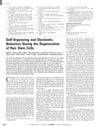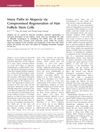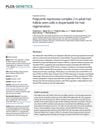Progressive Alopecia Reveals Decreasing Stem Cell Activation Probability During Aging of Mice with Epidermal Deletion of DNA Methyltransferase 1
July 2012
in “
Journal of Investigative Dermatology
”

TLDR Mice lacking a key DNA methylation enzyme in skin cells have a lower chance of activating stem cells necessary for hair growth, leading to progressive hair loss.
The study focused on the effects of DNA methylation on hair follicle stem cell aging by examining mice with a targeted deletion of DNA methyltransferase 1 (DNMT1) in epidermal cells. These mice developed progressive alopecia as they aged, characterized by a significant loss of hair fibers and follicles, with many remaining in the telogen phase. The mutant mice showed decreased proliferation and increased apoptosis in hair follicle cells, along with a reduced number of label-retaining cells in the stem cell region, indicating a diminished capacity to maintain progenitor stem cells. Despite a similar number of K15-positive stem cells in the mutant and wild-type mice, the mutant stem cells had a lower activation probability to form new hair germs, leading to fewer successfully formed hair filaments and some follicle degeneration over time. The study concluded that DNMT1 is essential for the regulation of hair follicle cell proliferation and apoptosis, and its reduction disrupts homeostasis, resulting in progressive alopecia. Quantitative data included a comparison of BrdU-positive cells in different hair follicle regions between wild-type and mutant mice, showing a significant reduction in the mutants.














